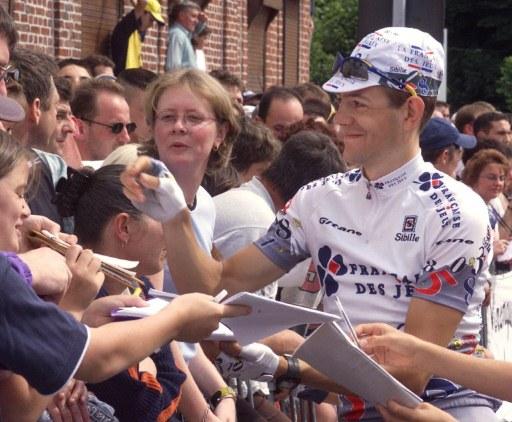Bassons calls for new faces in cycling management
Frenchman unconvinced by UCI's new rules on former dopers

Christophe Bassons has questioned the effectiveness of the UCI's decision to bar riders who serve doping suspensions from managing teams when their careers are over. The new regulation, which became effective from July 1, will not be applied retroactively, and Bassons said this meant that it was a rule which "did not really attack the milieu."
"The UCI rule is quite strict, but then when you see managers like [Saxo Bank manager] Bjarne Riis – who admitted in 2007 that he had used EPO – you ask yourself questions," Bassons told Le Monde. "What culture have they that they can still bring to the riders?"
Ostracised by many in the peloton after he clashed with Lance Armstrong over his views on doping during the 1999 Tour de France, Bassons abandoned the race and retired from cycling the following year. Over a decade on, the Frenchman feels that cycling's often troubled environment is a self-perpetuating one and that there is urgent need for a change in personnel.
"To stop doping, you need new heads," Bassons said. "Certain people come back as commentators. What credibility or objectivity can these people have? They haven't taken responsibility."
A noted proponent of clean cycling on the infamous Festina squad of the late 1990s, Bassons pointed out that a number of his former teammates retain high profiles within the sport. Richard Virenque, who admitted to using EPO while riding for Festina, is part of Eurosport's commentary team, while Didier Rous is a directeur sportif with Cofidis.
"Many ex-Festina riders have stayed on the circuit," Bassons said. "Commentators, directeurs sportifs, drivers: they're still there, because the hardest thing is not to be someone in the cycling world anymore."
As well as challenging the status quo of those involved in team management, Bassons also believes that the UCI and race organisers should alter the scheduling of races in order to help combat doping. However, with stage finishes at the Tour de France timed to attract the largest possible television audience, Bassons explained that financial concerns are placed firmly above the health of the riders.
Get The Leadout Newsletter
The latest race content, interviews, features, reviews and expert buying guides, direct to your inbox!
"If the UCI had the desire to change the rules of the game, it would organise race days in a different way," Bassons said. "Currently, the riders get up at 8 o'clock, start at midday and only eat two meals a day. They need three meals daily. The need for medical assistance would be reduced. The UCI has the power to change the calendar, but there are financial stakes, and the finish is fixed for 5 o'clock for the public."
In spite of the trickle of changes that cycling has undergone since his retirement, Bassons sounded a pessimistic note as to the chances of speedy wholesale renewal for the sport or its flagship event.
"In the long term, the sporting credit that the Tour benefited from is going to be eroded," he said. "Cycling is a family, and omertà allows it to go on and to restructure."

Barry Ryan was Head of Features at Cyclingnews. He has covered professional cycling since 2010, reporting from the Tour de France, Giro d’Italia and events from Argentina to Japan. His writing has appeared in The Independent, Procycling and Cycling Plus. He is the author of The Ascent: Sean Kelly, Stephen Roche and the Rise of Irish Cycling’s Golden Generation, published by Gill Books.